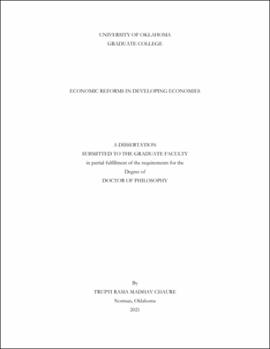| dc.description.abstract | This dissertation comprises three essays on policy program impact evaluation. The first essay (chapter 1) looks at the Employment Guarantee Act policy and its effect on the child sex ratio. The second essay (Chapter 2) investigates the effectiveness Productive Safety Net Program to buffer the negative impact of various shocks experienced by households on child’s outcomes. The last essay (Chapter 3) investigates in No Detention policy of the Right to Education Act and its effect on test scores for students.
Limited economic opportunity for women reduces their household bargaining power and the economic value of daughters, amplifying son preference. Chapter 1, co-authored with Dr. Daniel Hicks, studies India’s National Rural Employment Guarantee Scheme salary and mandated at least one-third of workers be women. In a setting where the gender gap in employment and wages are sizeable, NREGS represented both an income shock and a large relative improvement in the labor market for women. We use the staggered roll-out of NREGS to show that districts which implemented the program earlier experienced an improvement in child sex ratios in favor of girls. Although program implementation was non-random, we find impacts exist only in rural areas, not in the urban counterparts of the same district, where NREGS did not operate. Furthermore, effects are larger in middle and upper income districts and districts with the most skewed initial sex ratios, results which are inconsistent with an alternative selection story. Finally, the effects appear only for rural youth sex ratios, not for adult sex ratios, suggesting endogenous migration is not driving the results.
Many developing countries have opted for workfare programs to reduce the vulnerability of the poor and to lessen economic inequality. In chapter 2, I investigate the negative impact of household shocks on children’s outcomes and assesses the effectiveness of Ethiopia’s Productive Safety Nets Program (PSNP) in providing a mechanism to cope with these shocks using a fixed-effect model, and a unique counterfactual group approach. Understanding the extent to which the PSNP offsets the negative impact of shocks on children’s growth and welfare is important in accurately assessing the value of the program. In this paper, I find that while certain shocks reduce child school attendance, the implementation of PSNP appears to offset this effect. I find no robust evidence that it plays a similar role for child height or household labor outcomes.
The No detention policy act in 2010 guaranteed promotion to the next grade, and no student can be failed or expelled till grade 8. This paper investigates if education quality affected around the time of this law using test scores from Young Lives survey data. The test scores declined for students belonging to both higher and lower levels in test scores distribution. | en_US |

